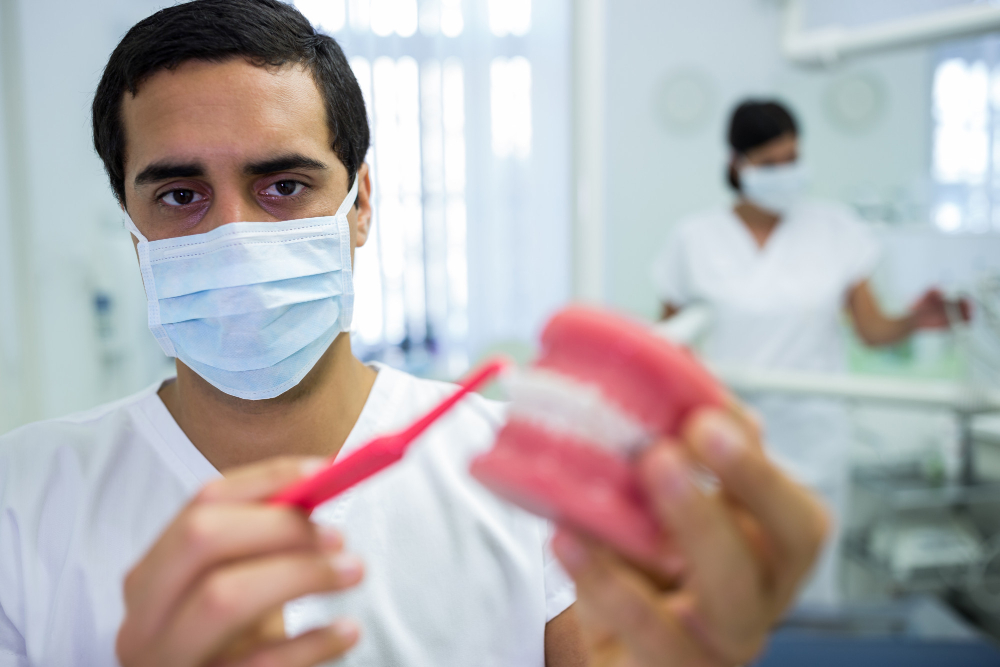
Gum disease,
also known as periodontal disease, is a common yet preventable condition that
affects millions of people worldwide. It begins with gum inflammation
(gingivitis) and, if left untreated, can progress to more severe forms, like
periodontitis, leading to tooth loss and other serious health issues.
Fortunately, gum disease is largely preventable with the right practices. In
this blog, we’ll share effective tips to help you maintain healthy gums and
prevent gum disease.
1. Brush Your Teeth Twice a Day
The
foundation of any good oral hygiene routine is regular brushing. Brushing your
teeth at least twice a day—morning and night—is essential for removing plaque,
the sticky film of bacteria that forms on your teeth and gums. Plaque buildup
can lead to gum inflammation and eventually gum disease if not removed
regularly.
Pro Tips:
- Use a soft-bristled toothbrush
and fluoride toothpaste to avoid irritating your gums while cleaning.
- Be sure to brush along the
gumline, where plaque tends to accumulate.
- Don’t forget to replace your
toothbrush every 3 to 4 months or sooner if the bristles are frayed.
2. Floss Daily
Even with
regular brushing, toothbrushes can’t reach between your teeth and along the
gumline. That’s where flossing comes in. Flossing helps to remove food
particles and plaque buildup between teeth, which can contribute to gum
disease.
How to Floss
Properly:
- Use about 18 inches of floss,
and wrap it around your fingers.
- Gently slide the floss between
your teeth and curve it around the base of each tooth.
- Avoid snapping the floss, as
this can damage your gums.
3. Use Mouthwash
Mouthwash
can help reduce plaque, fight bacteria, and refresh your breath. While it’s not
a substitute for brushing and flossing, incorporating an antimicrobial
mouthwash into your routine can add an extra layer of protection for your gums.
Tip:
Look for mouthwashes that contain fluoride or ingredients like chlorhexidine,
which specifically target bacteria that cause gum disease.
4. Maintain a Healthy Diet
What you eat
has a direct impact on your oral health. A balanced diet rich in vitamins and
minerals can help strengthen your gums and teeth. Foods high in vitamin C, like
citrus fruits, help your body fight infection and maintain healthy tissue,
including your gums.
What to
Include in Your Diet:
- Fresh fruits and vegetables
(carrots, apples, spinach, etc.)
- Lean proteins (chicken, fish,
etc.)
- Dairy products for calcium
(milk, cheese, yogurt)
- Whole grains and fiber-rich
foods
Avoid: Sugary snacks and drinks that feed
harmful bacteria in your mouth.
5. Quit Smoking
Smoking is
one of the leading risk factors for gum disease. It weakens your immune system,
making it harder for your body to fight off infections in your gums. Smokers
are also more likely to experience more severe gum disease, with symptoms like
receding gums and bone loss.
Quitting
smoking is one of the best things you can do for both your oral health and
overall well-being.
6. Visit Your Dentist Regularly
Routine
dental visits are crucial for maintaining gum health. Your dentist or dental
hygienist can detect the early signs of gum disease before it progresses,
helping you avoid serious complications down the road. Professional cleanings
remove plaque and tartar buildup that can’t be reached by brushing alone.
Recommended
Frequency:
- Visit your dentist every 6
months for regular check-ups and cleanings.
7. Recognize the Signs of Gum Disease Early
Being aware
of the early signs of gum disease can help you seek treatment before it
worsens. Some common symptoms include:
- Red, swollen, or bleeding gums
- Bad breath or a persistent bad
taste in your mouth
- Receding gums or pockets
forming between your gums and teeth
- Loose or shifting teeth
If you
notice any of these signs, make an appointment with your dentist as soon as
possible.
8. Manage Your Stress
Believe it
or not, stress can affect your oral health too. It weakens your immune system
and can increase your risk of developing gum disease. Managing stress through
relaxation techniques like meditation, yoga, or exercise can improve your
overall health and help keep your gums in good shape.
